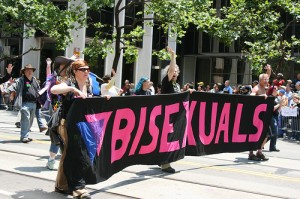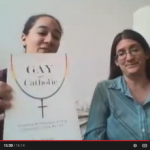 I’d still like more responses to the questions I posed to opponents of gay marriage yesterday, but, since turnabout is fair play, I’ll take a crack at some of the questions you guys asked about bisexuality in the thread. I’ll answer any others on this topic in the comments.
I’d still like more responses to the questions I posed to opponents of gay marriage yesterday, but, since turnabout is fair play, I’ll take a crack at some of the questions you guys asked about bisexuality in the thread. I’ll answer any others on this topic in the comments.
UPDATE: there’s still confusion in the comments so here’s the tl;dr takeaway: Bisexuality is totally unrelated to polyamory. Bisexuality describes the set of people who might attract you. Polyamory specifies what kind of relationship you want to have with people in that set.
As a bisexual is it easier for you to see that sexual orientation is changeable? I would imagine that a bisexual could become more attracted to one gender while they are dating that gender but then become more attracted to the opposite gender when they are in a different relationship. Maybe thats not how it works? But it seems that the existence of Bisexual people could be proof that sexual orientation could change.
Yeah, I’d say that’s not how it works. When I’m dating someone, I’m not more attracted to their gender generically, in the same way that someone dating a cellist doesn’t find that, in the abstract, they are now much more attracted to cellists than violinists. Some bi people like to quantify their relative attraction to each gender, but I’ve not found that particularly personally enlightening (see statistical note at the end of the post). Just as most readers probably don’t think of themselves as 70% brunettes, 20% redheads, 10% blondes; I don’t estimate or update my numbers on gender. When I say I’m bi, I mean that gender isn’t a disqualifier, and I tend to leave it at that.
Many arguments for gay marriage suggest that you should be able to marry whoever will satisfy your inborn sexuality. If that is true, the bisexual should be allowed to marry at least one man and one woman. And if we allow this, how do we not allow traditional heterosexual modes of polygamy; what do we say to my friend who is convinced that polyamory is an orientation unto itself?
I’m really glad FCCG asked this, because it gives me an opportunity to address a common misconception. Bisexuality is not the same thing as polyamory. Let me return to the hair color parallel. Plenty of straight men are attracted to both blondes and brunettes, but very few feel deprived or suppressed when they are dating only one girl with one hair color. I don’t have any more of a yen to date a boy and a girl at the same time than I need to be going steady with both an American and a Frenchwoman.
I don’t have a strong objection to polyamory, but my position on that has much more to do with the dynamics of heavy obligation to more than one person than it does with diversifying genitalia. Insofar as polyamorous marriage fits my conception of marriage — a life-long, difficult-to-exit commitment that is more focused on serving the other than securing physical pleasures for the self — I have no problem with it. Like covenant marriage, polyamory is ok by me in theory, but they get a bad rap because it is most visibly practiced by the people we suspect are taking the principle to excess.
Finally, a statistical note on why I find the numberic labeling of bisexuals to be weird. Let’s assume there exists a bisexual girl (Jane) who is equally attracted to men and women, so we thing of her as having a 50-50 split. Will we see her dating men as often as she does women? Definitely not. About 90% of men are attracted to women while only ~5% of women are [estimates are not precise]. So every time Jane makes a pass at someone, all else being equal, a guy is 18x as likely to be receptive as a girl. Unless she makes a special effort, someone would observe Jane dating guys 95% of the time and girls 5%. So what number should she use to label herself?
When people are trying to set you up on blind dates (or in most other contexts this comes up), it’s a lot easier to talk about genres of people you’re attracted to than it is to come up with numbers. And, after all, bi people are no more likely to be attracted to all men and women than a straight girl is to be attracted to all men. You might know your bi friend tends to prefer women to men, but, if that’s all you know, she’s liable to be disappointed when you introduce her to a cute butch girl when she’s actually more into femmes.












